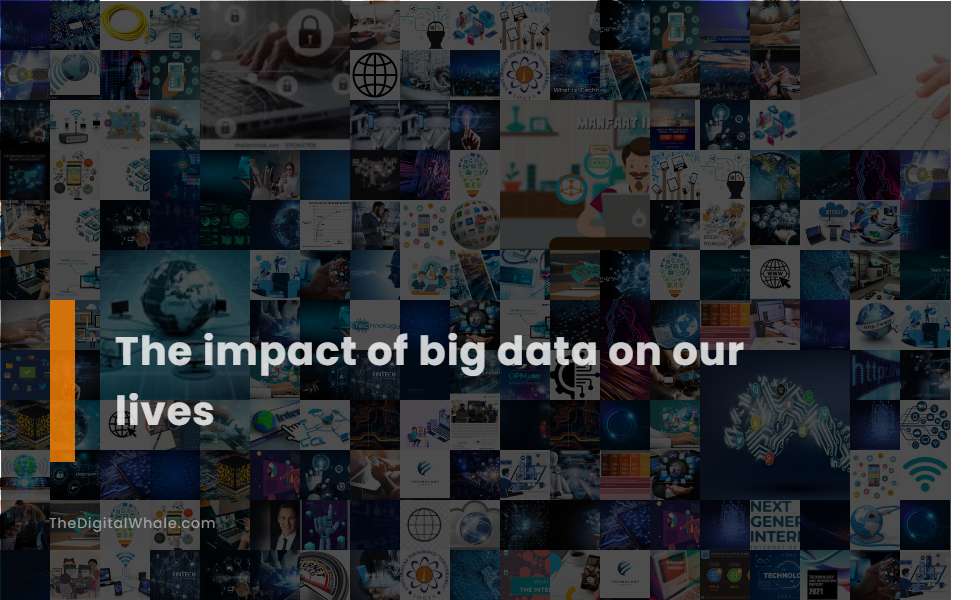The Impact of Big Data On Our Lives
How does big data affect personal life in specific ways? What are the benefits to using big data in online shopping? Let's find out more about The Impact of Big Data On Our Lives.

Enhanced Decision-Making: Big data provides comprehensive insights for better decision-making in various industries.
Big Data Analytics enhances decision-making by providing deep insights into consumer behavior, market trends, and industry patterns, enabling businesses to anticipate shifts, identify opportunities, and mitigate risks with greater accuracy and reduced uncertainty. By analyzing large datasets and real-time data, organizations can glean important insights, risks, patterns, and trends. This capability enables quick and informed decision-making that significantly impacts various industries, including healthcare, finance, and manufacturing. For a comprehensive understanding of how this technology revolutionizes business operations, visit The Impact of Big Data Analytics on Business Decision Making page.
Personalized Experiences: Big data analytics tailor ads, shopping recommendations, and other services to individual interests.
Big Data Analytics enables businesses to create highly personalized experiences by tailoring ads, shopping recommendations, and other services to individual interests. By utilizing detailed customer profiles, behavior predictions, and real-time interactions, businesses can enhance customer satisfaction and engagement. These advancements are unveiled at TechnoRely, illustrating the transformative role of big data in personalizing the customer experience.
Smart Home Automation: Thermostats and other smart devices adjust settings based on user preferences gathered from big data.
Big Data in smart home automation enables thermostats and other devices to analyze user habits and preferences in real-time, allowing for personalized and efficient adjustments to energy use, security, and convenience. This technology enhances the overall living experience through adaptive technology and machine learning. For more insights on how big data is revolutionizing smart home technology, visit the ICert Global blog for comprehensive information.
Traffic Management: Big data helps monitor and alleviate traffic congestion by analyzing real-time traffic patterns.
Big Data and Analytics in traffic management enable the identification of congestion areas and the creation of innovative strategies to optimize urban travel times, reduce emissions, and improve road safety by analyzing real-time traffic patterns and predicting traffic trends. By integrating Big Data with real-time traffic monitoring systems, such as those using AI and CCTV cameras, cities can significantly minimize congestion. This integration allows for the provision of granular event data, enabling dynamic adjustments to traffic management and detecting traffic violations to enhance overall urban mobility. For more insights into how data-driven approaches are transforming urban landscapes, check out this article on Take It Personel-ly, which delves into leveraging these technologies for improved mobility.
Public Health Monitoring: Big data tracks the spread of diseases and health hazards, aiding in epidemic response and prevention.
Big data significantly enhances public health monitoring by facilitating real-time surveillance of disease outbreaks, predicting disease patterns, and enabling targeted health campaigns and interventions. This improves the speed and effectiveness of epidemic response and prevention. Big Data in public health allows for faster, real-time monitoring of disease outbreaks, better identification of at-risk populations, and more precise surveillance of both communicable and non-communicable diseases, although it also presents challenges such as data quality and privacy concerns.
Related:
What are ways to stay sane when life gets crazy? What are some tips to stay sane in an insane world? Let's find out more about How To Stay Sane In A World That's Always Connected.
Urban Planning: Big data is used to optimize urban planning, including public transport functionality and smart city initiatives.
Big Data Analytics revolutionizes urban planning by providing data-driven insights to optimize infrastructure, public transport, and smart city initiatives, enabling efficient, sustainable, and livable cities through the integration of diverse data sources and predictive modeling. For more information on how big data is transforming urban spaces, visit the LunarTech Blog for in-depth insights and analysis.
Energy Efficiency: Smart meters and big data analytics optimize energy consumption for more efficient use.
Big Data Analytics, particularly through the use of smart meters and IoT devices, revolutionizes energy efficiency by identifying patterns and trends in energy consumption, optimizing energy use, and improving the management of smart grids, thereby reducing costs and environmental impact. For more detailed insights, the Energy In Demand website offers extensive information on how these technologies are shaping the future of energy management.
Crime Prevention: Big data analytics transform police work by predicting and preventing crimes rather than just investigating them.
Big data analytics in policing, particularly through Predictive Policing, use machine learning and AI to analyze various data types, enabling law enforcement to predict where and when crimes might occur, and make tactical decisions to prevent criminal activity before it happens. For more insights on the role of analytics in enhancing policing work, visit Thomson Reuters.
Customer and Market Insights: Big data provides valuable insights into market trends and consumer habits, benefiting product development and business strategies.
Big Data Analytics provides unparalleled market intelligence, allowing companies to understand customer behavior, identify trends, and gain competitive insights, which significantly enhance product development and business strategies by aligning them closely with consumer preferences and market conditions. For more detailed information, visit the Big Data Analytics page on Domo's website.
Privacy Concerns: Big data raises significant privacy issues, including data breaches, profiling, and lack of control over personal information.
Big Data raises significant privacy concerns, including the risk of data breaches that can expose vast amounts of personal information, profiling that can lead to discriminatory practices, and a lack of control over how personal data is collected, used, and shared. Additionally, the integration and analysis of diverse datasets can lead to the re-identification of individuals even when personal details are anonymized, further threatening privacy and confidentiality. To explore these concerns further, visit Scarlett Culture for comprehensive insights on this critical issue.
Related:
How can a recruiter find out what a candidate is interested in? Which online job portal provides users with access to a wide range of job opportunities? Let's find out more about The Best Way To Use Technology In Job Searches.
